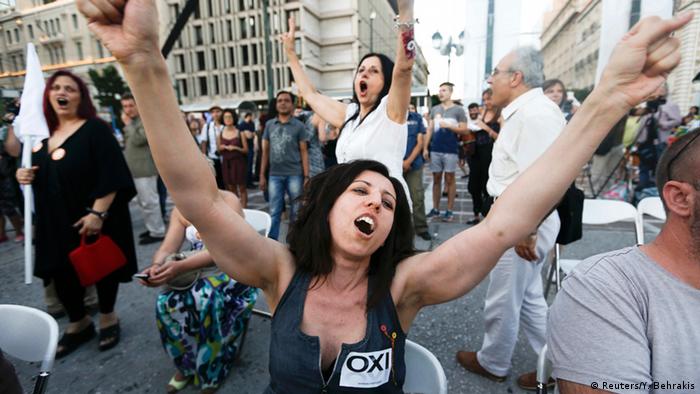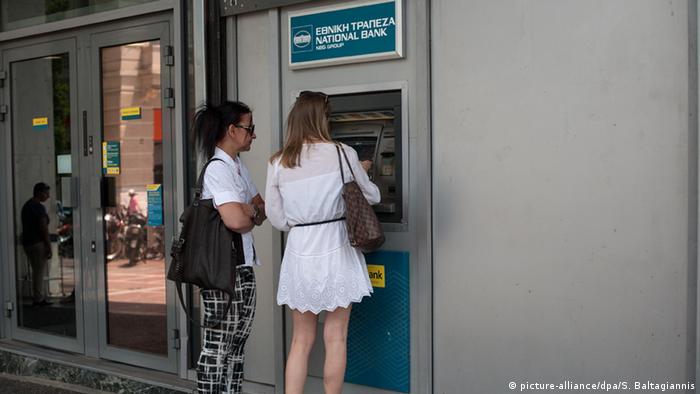ECONOMY
Greeks and the desperate fight for cash
Paper money is becoming a coveted commodity in Greece. Some island inhabitants have to take a boat to get cash, and business owners are afraid for their security. DW's Greece correspondent Jannis Papadimitriou reports.
Wine salesman Dimitris is worried. Stacks of receipts and credit card slips pile up around his cash register - and no small sums either.
"This weekend I had a woman come in here and buy 650 euros [$714] of wine and spirits for a wedding party. She paid with her credit card. A shop owner then came in an bought 350 euros of wine - also with his card."
Given that Greek banks are currently closed and national bankruptcy is looming, Dimitris is worried that the entire credit system will implode and all he'll be left with is unpaid bills. But he also said he knows there's really no other choice: "I am dependent on the business brought in by my customers."
Most of his customers used to pay in cash.
But paper money has become rare in Greece. And this is doubly difficult for Dimitris. Not only are revenues he would have already received delayed; he is also forced to pay in cash when ordering new stock. The companies he does business with are only making deliveries in exchange for cash. "And they have already set minimum amounts for deliveries to save on fuel," he added.
60 euros a day - if you're lucky
Greek banking institutions have been closed since June 28, after having lost a quarter of their reserves in the past six months. The Athens government blames international lenders for the situation as the latter have refused to continue supplying additional financial support.
Greek Prime Minister Alexis Tsipras originally promised his people that the banks would open again after Sunday's referendum. Then that re-opening was postponed to Wednesday. That didn't happen and now the latest announcement is that the banks will remain closed until Monday. But for now, capital controls mean only 60 euros can be withdrawn per day.

Many Greeks celebrates the 'no' vote in Sunday's referendum, now they're watching to see what comes next in Greece
In the Athens district of Pangrati, Maria waits at the Alpha Bank to withdraw her 60 euros. There is no line here right now, perhaps because of the intense heat of 35 degrees Celsius. But that doesn't matter to her - she wants to get her 60 euros before she heads across the street to the Greek National Bank to get another 60 euros from the account she keeps there.
"You can't even get the 60 euros," the 50-year-old told DW. "If you ask for that amount, an error message pops up saying withdrawals can only be in denominations of 50 euros. There's a rumor going around that the reason for this is that there are no more 10 euro notes in circulation."
Islands without any cash
And if you thought the situation was dire in the capital, consider that on some Greek islands there isn't a single cash machine in operation.
"Our island has a bank, and it is closed at the moment," reported Maria Kakkali, mayor of the small island of Aghios Evstratios. "But there isn't a working ATM.
"If you want to withdraw your 60 euros, you have to take a boat ride of over two hours to the nearest island of Lemnos. And be prepared to wait in line," she added.
Locals have taken to alternating who travels to Lemnos with other residents' bank cards to withdraw 60 euros each for everyone.
Nobody knows what's going to happen to the Greek economy. The government has rejected rumors of the creation of a parallel currency and tighter controls on cash withdrawals. At present, cash transfers abroad are only allowed with special permission from a recently created government agency.
It all depends if Athens can strike a deal with its creditors. Back at his wine shop, Dimitris hopes that that can happen.
"Last night, there was a break-in at a store around the corner," he said. "Apparently, the owner was hiding cash. Who will be next?


No comments:
Post a Comment